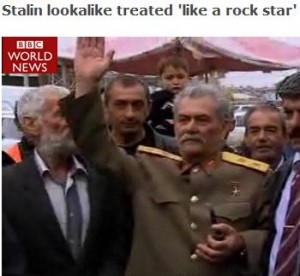
I love the BBC to bits, but I have had enough.
Yet another report, the second ‘profile’ in a week about the resurgence of Stalin’s legacy in the former USSR, has put my knickers in a twist. This time, we see a Stalin look-alike treated ‘like our own dear Queen’ in his hometown of Gori, Georgia.
Certainly, there are troubling signs of a ‘Stalin rehabilitation’ in Russia and elsewhere, which have rightly been treated seriously in the Western media and have been closely scrutinised on this blog.
There is no doubt: Stalin-love is being whipped up in Russia and Georgia by cynical politicians to foster nationalism and raise support for strong-arm right-wing politics.
But the sanctimonious ‘look-at-those-weirdo-non-European-value-orientated-Stalinists-over-there” anglophone media coverage is fast becoming an equally cynical exercise in feel good anti-Eastern prejudice. The implication is clear: We would never think of supporting such tyrants!
There are big problems with outsiders ‘exposing’ the crimes of other countries. Such accounts are all too often coloured and motivated by ulterior motives. And usually, a good litmus test of pure motives is whether the person highlighting the crimes in another country is as critical and incisive about those committed by his own.
For example, during the cold war, all the Western scholars who criticised the Soviet bloc with the same vigour with which they criticised their own countries could comfortably share a Mini. Most mainstream American and British historians of Russia (Gaddis, Service, Applebaum) have always been right-wing patriots and credulous believers in ‘Western democracy and capitalism’ with an axe to grind against those daring to enact alternative ways of socio-econonic organisation.
In a classic essay, Mark Ames once wrote why US columnist and historian Anne Applebaum is nothing like murdered Russian reporter Politkovskaya:
Applebaum is a special case, one of those moral crusaders, the American Anna Politkovskaya, who has made a living courageously exposing state crimes committed by…get this…not her own country, oh heck no! Because her own country only does good!
Nope, Anne Applebaum makes her living by sitting in the safety of Washington DC, and exposing crimes committed by a country on the other side of the globe! That country being Russia of course. Hey, give that woman a Pulitzer, will ya?!
Hence her book Gulag, packed with all the affected moral outrage that you’d expect. Indeed, one thing that has always filled Applebaum with rage is wondering why Russians don’t take her seriously (a question she poses as more abstract — ie, why don’t Russians care about the Gulags as much as Anne does?).
Here’s why: Can you imagine how much moral authority a right-wing Russian journalist’s book about the American genocide of Indians would have in America? Answer: about as much as Anne’s book has in Russia. None.
That kind of thing is not dispassionate history but rather Orientalism in its most classic sense, defined by Said as ‘a cultural apparatus [which] is all aggression, activity, judgment”. 
And it cuts to the crux of the BBC story about Stalinism in Georgia. From my experience of Rupert Wingfield-Hayes’s reporting, he is a middle of the road liberal Brit, with a healthy respect for the Monarchy, Winston Churchill and his neighbourhood pub. And that’s OK!
But if a Russia Today camera crew were to bring a Churchill lookalike to a London school (assuming any of the English pupils, with their notoriously abysmal history knowledge, would even recognise him) and film their incredulity whenever anyone called him a great WWII leader rather than pointing out his enthusiastic gassing of Arabs, repatriation of Russian POWs to certain deaths in the Gulags, complicity in the Bengal famine, brutal crackdowns on domestic anarchists and striking workers, casual sexism or unhealthy body mass index, they would not be taken very seriously, even though all those things about Churchill are very much true.
Like Ivan the Terrible and Tamerlane, not to mention Wingfield-Hayes’s beloved British Royal Family, Stalin killed a great many of his own people. But Wingfield-Hayes is very wrong when he attributes the adulation of Stalin by young people to the ignorance of his crimes. If anything, the older generation that lived under Stalin is even more likely to feel nostalgic for those days.
This is partly because most of those who disliked Stalin did not survive to tell the tale, but also for some other, more difficult reasons. For example, many Soviet families saw sons of someone murdered by Bolsheviks in the revolution later joins the Red Army and becomes a Stalinist. My grandfather was just one such person.
It is difficult for a 21st century middle class British person, a legatee of two centuries of peace, democracy and industrial development, to fully understand a context in which the deaths of thousands of people occur routinely; a yardstick, not a terrifying aberration. In his masterful history of the Russian Revolution, A People’s Tragedy, Orlando Figes describes the horrific brutality of daily life under tsarism and how it was almost seamlessly followed by the horrific brutality of Stalinism.
In their brutality, the regimes were very comparable; the Bolsheviks were simply more productive owing to better mechanised and more rationally implemented terror than their Tsarist predecessors.
For most long-suffering Russians, the only real difference between them was tsarist Russia was brutal and autocratic, as well as backward, poor, constantly losing wars, disrespected and disintegrating. Whereas Stalin’s USSR was brutal and autocratic, but also modernising, strong, proud; cobbling together a new empire, defeating Germany and Japan, building a nuclear bomb, sending men to space, feeding and educating its people. Yes, the violence and brutality were a constant, but they was not the whole story.
Most importantly, Russians and Georgians believe that Stalin not only brought their backward countries greatness but also liberated their country from the Nazis genocide, a gratitude that is very difficult to understand for British and American people, who (barring Pearl Harbour and a relatively light Blitz) have never experienced an invasion in living history. This achievement should not be underestimated, especially considering everything the British have forgiven their Churchill for his more modest war-time successes.
 Of course, Churchill’s imperial arrogance, racism and casual slaughter of non-Europeans should be viewed in the context of his statesmanship in WWII and great-power diplomacy. That does not excuse them. But sensitivity to this context is what prevents intelligent people from other countries from wondering why Churchill, or George Washington for that matter, are considered heroes rather than villains (although of course the scale of their villainry was smaller than Stalin’s), in the same way Wingfield-Hayes does.
Of course, Churchill’s imperial arrogance, racism and casual slaughter of non-Europeans should be viewed in the context of his statesmanship in WWII and great-power diplomacy. That does not excuse them. But sensitivity to this context is what prevents intelligent people from other countries from wondering why Churchill, or George Washington for that matter, are considered heroes rather than villains (although of course the scale of their villainry was smaller than Stalin’s), in the same way Wingfield-Hayes does.
None of this is to say, or course, that such ‘contextualisation’ is benign when done by the Russian government. Promoting Stalin’s achievements appears designed to make young Russians believe that brutal and autocratic policies could be ‘worth it’ to achieve ‘a strong country’ (whatever that means) at any price, with clear implications for Putin’s grips on power.
Yet according to Figes, who believes that the government is rehabilitating Stalin, the Kremlin’s aim ‘is not to deny Stalin’s crimes but to emphasise his achievements as the builder of the country’s “glorious Soviet past”. It wants Russians to take pride in their Soviet past and not to be burdened with a paralysing sense of guilt about the repressions of the Stalin period’.
But there is a difference between knowledge of one’s country’s crimes, and guilt-induced paralysis. While I cannot support the Kremlin’s historical revisionism because of its whitewashing, spurious scholarship, right-wing political subtexts and ulterior motives, neither do I believe that Russians should be made to renounce their entire 20th century history.
Churchill himself wrote in 1935 that “[History] is replete with examples of men who have risen to power by employing stern, grim, and even frightful methods but who, nevertheless, when their life is revealed as a whole, have been regarded as great figures whose lives have enriched the story of mankind. So may it be with Hitler.”
That many in the former USSR may say the same of Stalin should not inspire such self-righteous incredulity at the BBC.